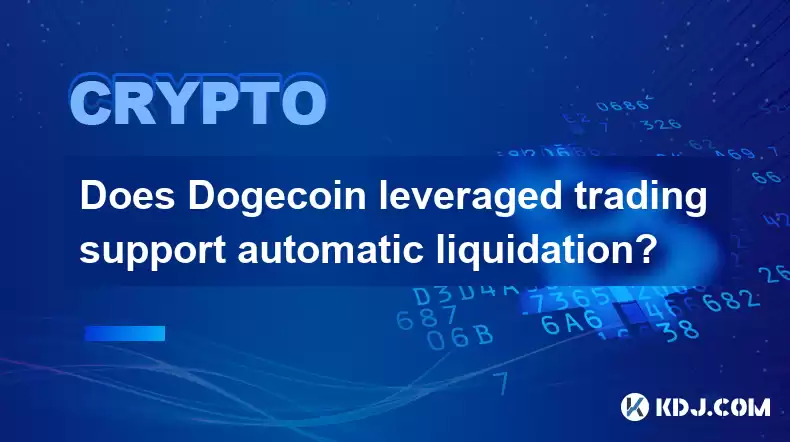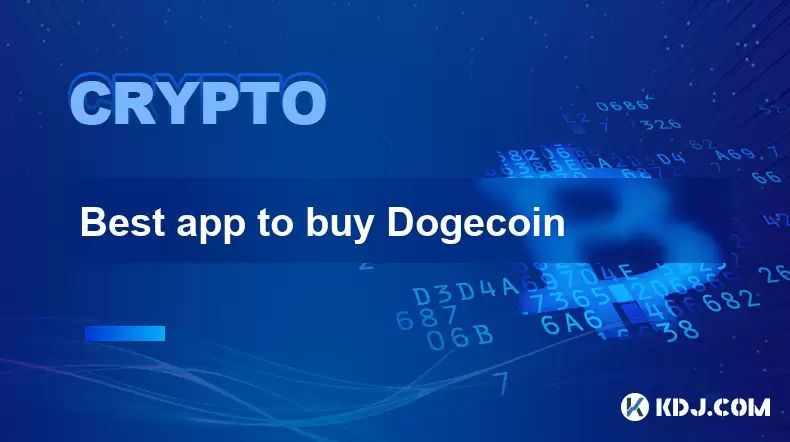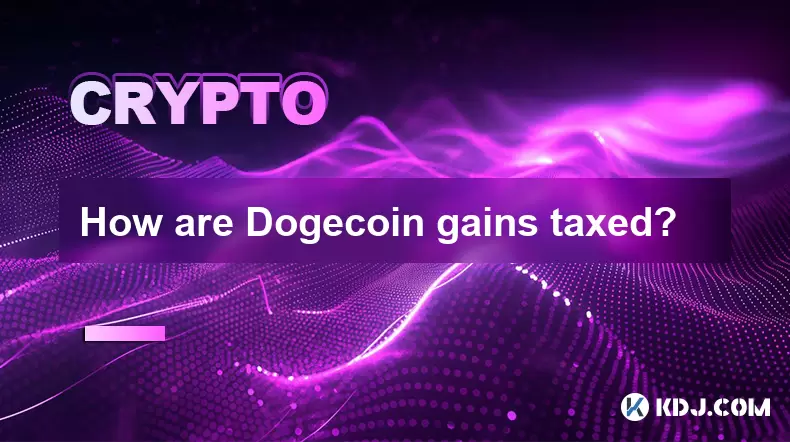-
 bitcoin
bitcoin $87959.907984 USD
1.34% -
 ethereum
ethereum $2920.497338 USD
3.04% -
 tether
tether $0.999775 USD
0.00% -
 xrp
xrp $2.237324 USD
8.12% -
 bnb
bnb $860.243768 USD
0.90% -
 solana
solana $138.089498 USD
5.43% -
 usd-coin
usd-coin $0.999807 USD
0.01% -
 tron
tron $0.272801 USD
-1.53% -
 dogecoin
dogecoin $0.150904 USD
2.96% -
 cardano
cardano $0.421635 USD
1.97% -
 hyperliquid
hyperliquid $32.152445 USD
2.23% -
 bitcoin-cash
bitcoin-cash $533.301069 USD
-1.94% -
 chainlink
chainlink $12.953417 USD
2.68% -
 unus-sed-leo
unus-sed-leo $9.535951 USD
0.73% -
 zcash
zcash $521.483386 USD
-2.87%
Does Dogecoin leveraged trading support automatic liquidation?
Dogecoin leveraged trading's automatic liquidation depends entirely on the platform; centralized exchanges often offer it, while decentralized exchanges typically don't. Understanding margin calls, liquidation prices, and risk management is crucial to avoid significant losses.
Mar 12, 2025 at 07:25 am

- Dogecoin leveraged trading does not inherently support automatic liquidation in the same way as some centralized exchanges.
- The mechanism of liquidation depends heavily on the specific exchange or platform used for trading.
- Understanding margin calls, liquidation prices, and risk management is crucial for leveraged Dogecoin trading.
- Decentralized exchanges (DEXs) generally lack automated liquidation features.
- Leveraged trading on Dogecoin carries significant risk, and users should proceed with caution and thorough understanding.
The question of automatic liquidation in Dogecoin leveraged trading isn't straightforward. It depends entirely on the platform you're using. Unlike some centralized exchanges offering futures or margin trading, the inherent nature of Dogecoin and the decentralized platforms it operates on often means automatic liquidation isn't a standard feature. Let's break down why.
Centralized exchanges (CEXs) offering Dogecoin leveraged trading frequently incorporate automatic liquidation mechanisms. This happens when the trader's position falls below a certain maintenance margin level. The exchange then automatically sells (liquidates) part or all of the trader's assets to cover the losses and repay the borrowed funds. The specific trigger point – the liquidation price – varies between exchanges and is usually calculated based on the leverage used and the price movement of Dogecoin.
However, the availability of automatic liquidation even on CEXs isn't guaranteed across all trading pairs or account types. Always check the specific terms and conditions of your chosen exchange before engaging in leveraged trading. Some platforms may require manual liquidation procedures.
Decentralized exchanges (DEXs) present a different landscape. Most DEXs do not offer built-in margin trading or automatic liquidation features. The decentralized nature and lack of a central authority make it difficult to implement such a system effectively and fairly. Users engaging in leveraged trading on DEXs usually need to rely on external lending and borrowing protocols, increasing the complexity and risk. These protocols may have their own liquidation mechanisms, but these will likely differ significantly from those on CEXs.
Understanding Margin Calls and LiquidationBefore diving into leveraged Dogecoin trading, understanding key terms is essential. A margin call occurs when your position's value drops below the exchange's maintenance margin requirement. This triggers a warning that your position is at risk of liquidation. You'll typically have a grace period to add more funds (margin) to your account to meet the requirement.
If you fail to meet a margin call within the given timeframe, the exchange will proceed with liquidation. This means they will sell your Dogecoin to cover your debt. The price at which this happens is the liquidation price, usually set slightly below the current market price to ensure the exchange recoups its losses. This process is usually automated to protect the exchange from further losses.
The difference between the liquidation price and the current market price at the time of liquidation represents a loss for the trader. This loss can be significant, especially with high leverage.
Risk Management in Leveraged Dogecoin TradingLeveraged trading magnifies both profits and losses. While the potential for high returns is tempting, the risk of significant losses is equally substantial. Proper risk management is crucial to avoid catastrophic outcomes.
- Start Small: Begin with small positions and low leverage to gain experience and assess your risk tolerance.
- Use Stop-Loss Orders: These orders automatically sell your position when the price reaches a predetermined level, limiting your potential losses.
- Diversify Your Portfolio: Don't put all your eggs in one basket. Diversify your investments across different assets to reduce overall risk.
- Understand Leverage: Higher leverage means higher potential profits but also significantly higher risk. Use leverage cautiously and only if you fully understand the implications.
- Monitor Your Positions: Regularly check your positions and adjust your strategy as needed. Market conditions can change rapidly.
Remember, the volatility of cryptocurrencies, including Dogecoin, makes leveraged trading particularly risky. A seemingly small price movement can trigger a margin call and lead to significant losses if not managed properly.
Frequently Asked Questions:Q: Can I avoid automatic liquidation in Dogecoin leveraged trading?A: You can mitigate the risk of automatic liquidation by carefully managing your position, using stop-loss orders, and maintaining sufficient margin. However, you cannot entirely eliminate the risk, especially in highly volatile market conditions.
Q: What happens to my remaining assets after liquidation?A: After liquidation, the exchange uses the proceeds from the sale of your Dogecoin to cover your debt. Any remaining assets are usually returned to your account. However, if the liquidation proceeds are insufficient to cover your debt, you may incur further losses.
Q: Are there any fees associated with liquidation?A: Yes, most exchanges charge fees for liquidation, adding to your overall losses. These fees vary depending on the exchange.
Q: Is automatic liquidation fair?A: The fairness of automatic liquidation is a complex issue. While it protects exchanges from losses, it can also lead to significant losses for traders, particularly in rapidly changing market conditions.
Q: What alternatives exist to leveraged trading on Dogecoin?A: Alternatives include spot trading (buying and holding Dogecoin without leverage), investing in Dogecoin-related projects, or participating in staking pools (if available). These options generally carry lower risk but also potentially lower returns.
Disclaimer:info@kdj.com
The information provided is not trading advice. kdj.com does not assume any responsibility for any investments made based on the information provided in this article. Cryptocurrencies are highly volatile and it is highly recommended that you invest with caution after thorough research!
If you believe that the content used on this website infringes your copyright, please contact us immediately (info@kdj.com) and we will delete it promptly.
- Blockchains, Crypto Tokens, Launching: Enterprise Solutions & Real Utility Steal the Spotlight
- 2026-01-31 12:30:02
- Crypto Market Rollercoaster: Bitcoin Crash Recovers Slightly Amidst Altcoin Slump and Lingering Fear
- 2026-01-31 13:10:01
- Solana's Stumble and APEMARS' Rise: Crypto Investors Navigate Volatile Markets
- 2026-01-31 13:05:01
- Bitcoin Options Delta Skew Skyrockets, Signaling Intense Market Fear Amidst Volatility
- 2026-01-31 13:00:02
- Cardano Secures Tier-One Stablecoin: USDCX Arrives Amidst Global Regulatory Push
- 2026-01-31 13:00:02
- A Shining Tribute: Oneida Woman, Washington's Army, and the New $1 Coin
- 2026-01-31 12:55:01
Related knowledge

Bitcoincoin burning mechanism
Jul 20,2025 at 09:21pm
What is the Dogecoin burning mechanism?The Dogecoin burning mechanism refers to the process of permanently removing DOGE tokens from circulation by se...

How to earn free Bitcoincoin?
Jul 19,2025 at 10:08pm
What is Dogecoin and Why Earn It?Dogecoin (DOGE) started as a meme-based cryptocurrency in 2013 but has grown into a widely recognized digital asset. ...

Is Coinbase a good wallet for Bitcoincoin?
Jul 19,2025 at 04:42pm
Understanding Coinbase as a Wallet Option for DogecoinWhen considering where to store Dogecoin, Coinbase is often mentioned as a potential option due ...

How to buy Bitcoincoin with PayPal?
Jul 23,2025 at 06:57am
Understanding the Basics of Buying DogecoinBefore diving into the process of buying Dogecoin with PayPal, it’s essential to understand what Dogecoin i...

Best app to buy Dogecoin
Jul 23,2025 at 03:08pm
What Is a Cryptocurrency Exchange and How Does It Work?A cryptocurrency exchange is a digital marketplace where users can buy, sell, or trade cryptocu...

How are Dogecoin gains taxed?
Jul 25,2025 at 07:01am
Understanding the Taxation of Dogecoin GainsWhen it comes to Dogecoin (DOGE), many investors are drawn to its meme-inspired branding and volatile pric...

Bitcoincoin burning mechanism
Jul 20,2025 at 09:21pm
What is the Dogecoin burning mechanism?The Dogecoin burning mechanism refers to the process of permanently removing DOGE tokens from circulation by se...

How to earn free Bitcoincoin?
Jul 19,2025 at 10:08pm
What is Dogecoin and Why Earn It?Dogecoin (DOGE) started as a meme-based cryptocurrency in 2013 but has grown into a widely recognized digital asset. ...

Is Coinbase a good wallet for Bitcoincoin?
Jul 19,2025 at 04:42pm
Understanding Coinbase as a Wallet Option for DogecoinWhen considering where to store Dogecoin, Coinbase is often mentioned as a potential option due ...

How to buy Bitcoincoin with PayPal?
Jul 23,2025 at 06:57am
Understanding the Basics of Buying DogecoinBefore diving into the process of buying Dogecoin with PayPal, it’s essential to understand what Dogecoin i...

Best app to buy Dogecoin
Jul 23,2025 at 03:08pm
What Is a Cryptocurrency Exchange and How Does It Work?A cryptocurrency exchange is a digital marketplace where users can buy, sell, or trade cryptocu...

How are Dogecoin gains taxed?
Jul 25,2025 at 07:01am
Understanding the Taxation of Dogecoin GainsWhen it comes to Dogecoin (DOGE), many investors are drawn to its meme-inspired branding and volatile pric...
See all articles





















![Ultra Paracosm by IlIRuLaSIlI [3 coin] | Easy demon | Geometry dash Ultra Paracosm by IlIRuLaSIlI [3 coin] | Easy demon | Geometry dash](/uploads/2026/01/31/cryptocurrencies-news/videos/origin_697d592372464_image_500_375.webp)




















































